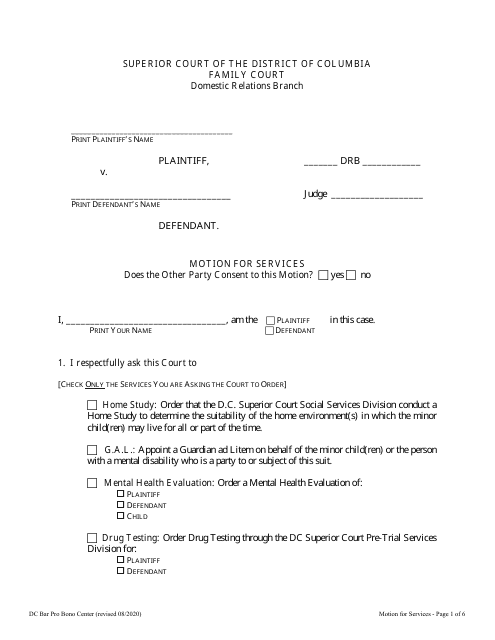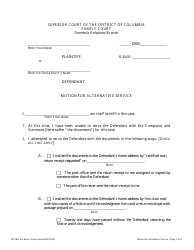Motion for Services - Washington, D.C.
Motion for Services is a legal document that was released by the District of Columbia Courts - a government authority operating within Washington, D.C..
FAQ
Q: What is a motion for services?
A: A motion for services is a legal document that requests the court to order the provision of certain services.
Q: What types of services can be requested in a motion for services?
A: Various services can be requested, such as subpoenas, discovery assistance, expert witnesses, or interpreter services.
Q: Do I need to pay a fee to file a motion for services?
A: Yes, there is usually a filing fee associated with filing a motion for services. The exact amount can be found on the court's fee schedule.
Q: What should I include in a motion for services?
A: Your motion should include the specific services you are requesting, the reasons why you need those services, and any supporting documents or evidence.
Q: How long does it take for a court to decide on a motion for services?
A: The time it takes for a court to decide on a motion for services can vary. It is best to check with the court for their specific timeline.
Q: Can I request a hearing for my motion for services?
A: Yes, you can request a hearing if you believe it is necessary for your motion. You should include your request for a hearing in the motion itself.
Q: What should I do if my motion for services is denied?
A: If your motion is denied, you may have the option to file an appeal or seek alternative solutions. Consulting with an attorney can help you determine the best course of action.
Q: Is there a specific format that I need to follow for a motion for services?
A: The court may have specific rules or requirements for the format of motions. It is important to review the court's local rules or consult with an attorney to ensure your motion is properly formatted.
Q: Can I file a motion for services on behalf of someone else?
A: In some cases, you may be able to file a motion for services on behalf of someone else, such as a minor or a person who is incapacitated. However, you should consult with an attorney to determine if this is appropriate in your situation.
Form Details:
- Released on August 1, 2020;
- The latest edition currently provided by the District of Columbia Courts;
- Ready to use and print;
- Easy to customize;
- Compatible with most PDF-viewing applications;
- Fill out the form in our online filing application.
Download a fillable version of the form by clicking the link below or browse more documents and templates provided by the District of Columbia Courts.













